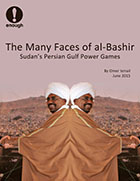
Recent political shifts in the Persian Gulf could benefit the ruling elite in economically isolated and politically ostracized Sudan, according to a new Enough Project report by Senior Advisor Omer Ismail. The report, The Many Faces of al-Bashir: Sudan’s Persian Gulf Power Games, outlines Sudan’s growing economic dependence on Persian Gulf countries and posits that those countries now have even more leverage to press the ruling National Congress Party (NCP) to agree to the political reforms and the compromises with the opposition that are needed to forge a lasting peace. The report also recommends that American policymakers should take advantage of their strong ties with the Gulf and the Gulf’s strong ties to Sudan to encourage greater constructive engagement from Sudan.
“Diplomats frequently say they don't have leverage against the regime in Khartoum. While that claim is debatable, what's clear is that staunch American allies like Saudi Arabia, the United Arab Emirates and Qatar have significant influence over President Bashir. As Bashir begins a new term in office, America's Gulf allies can and should do more to pressure him to end the widespread human rights abuses against his own people and to participate more constructively in the peace process.”– John Prendergast, Founding Director of the Enough Project
Relationships with both the Persian and Arab Gulf countries are important for Khartoum’s foreign policy. Arab Gulf countries have provided Sudan with vital foreign direct investment, foreign currency transfusions, banking ties, remittances, military aid, and significant trade ties. Persian Gulf countries are not only important investors, bankers, and military backers for Sudan; they are also significant trade partners in labor and goods for Sudan.
Because Sudan is economically isolated, distressed, and heavily dependent on a small number of financial backers, it is more vulnerable than ever to any loss of support. Years of increasing internal economic hardship in Sudan, combined with external economic isolation, including international sanctions, have created a severe financial crisis for the NCP. In response to severe economic pressure, the Sudanese government has sought to capitalize on gold discovered in Darfur—an important potential revenue source for the regime, but one that does not fully compensate for the loss of oil revenue. Exports of gold, particularly gold from North Darfur mines that have been the site of conflict, are currently a significant source of foreign exchange for the Sudanese government. Gold purchases by Sudan’s Central Bank have, however, also exacerbated currency inflation and further complicated the economic crisis, continuing to leave Sudan heavily dependent on Persian Gulf countries for funds, foreign exchange, and investment.
The report concludes that U.S. policymakers should take advantage of strong relationships with Gulf allies to ask that these states use their considerable leverage to support a push for an end to Sudan’s deadly internal wars. Recommendations include encouraging Qatar to avoid making further cash infusions into Sudan’s Central Bank, dissuading Saudi Arabia from entertaining Bashir’s requests for financial support in exchange for Sudanese participation in the Yemen coalition, and further encouraging the United Arab Emirates to remove conflict-affected gold from the global supply chain and serve as a constructive partner in international efforts to change the calculus of Sudan’s leaders.
Read the full report, The Many Faces of al-Bashir: Sudan’s Persian Gulf Power Games.

